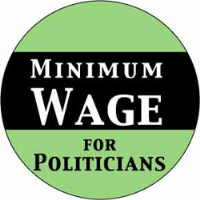25 Million Americans Earn Less than Obama’s Proposed Increased Minimum Wage

If President Barack Obama can convince Congress (particularly Republicans) to support his proposed increase in the minimum wage, the effects will be substantial.
It is estimated that nearly 25 million Americans earn less than $10.10 an hour at their jobs. Obama is urging Congress to raise the federal minimum wage to that rate, from its current $7.25, by 2016.
Those who would experience the biggest bumps in their paychecks would be the 3.5 million workers who make $7.25 an hour or less (federal law allows tipped employees to be paid less than $7.25).
But while a nearly $3 per hour increase might seem like a lot of money, the increase would still leave many Americans struggling to get out of poverty. For instance, a single mother with two children earning $9 an hour at a full-time job makes only $18,720, which puts her below the poverty line.
The Center for Economic Policy Research estimates that more than half of all workers making $9 or less an hour are 25 or older. At one time it was assumed that most earning that little were teenagers, but no more. Today, only 17% of them are under 20, compared to 28% in 2000.
“Minimum-wage and low-wage workers are older and more educated than 10 or 20 years ago, yet they’re making wages below where they were 10 or 20 years ago after inflation,” John Schmitt, senior economist at the research center, told The New York Times. “If you look back several decades, workers near the minimum wage were more likely to be teenagers—that’s the stereotype people had. It’s definitely not accurate anymore.”
Opponents of Obama’s plan jumped on an analysis released by the Congressional Budget Office (CBO), which concluded that raising the minimum wage to $10.10 could result in half a million job losses.
The CBO also said in its report that “as with any such estimates, however, the actual losses could be smaller or larger; in CBO’s assessment, there is about a two-thirds chance that the effect would be in the range between a very slight reduction in employment and a reduction in employment of one million workers.”
Some economists said it’s unlikely there would be any job losses, citing problems with the CBO’s methodology, and many said the improved financial condition of those who receive raises would pump enough money back into the economy as a whole to outweigh any job losses.
-Noel Brinkerhoff
To Learn More:
Low-Wage Workers Are Finding Poverty Harder to Escape (by Steven Greenhouse, New York Times)
Will a Minimum Wage Hike Really Cost Jobs? (by George Zornick, The Nation)
The Effects of a Minimum-Wage Increase on Employment and Family Income (Congressional Budget Office)
Report: The Effects of a Minimum-Wage Increase on Employment and Family Income (Congressional Budget Office) (pdf)
3 of 4 Americans Approve of Raising Minimum Wage (by Noel Brinkerhoff and Danny Biederman, AllGov)
Minimum Wage, Factoring for Inflation, is Lower than in 1956 (by Noel Brinkerhoff, AllGov)
- Top Stories
- Unusual News
- Where is the Money Going?
- Controversies
- U.S. and the World
- Appointments and Resignations
- Latest News
- Trump Orders ICE and Border Patrol to Kill More Protestors
- Trump Renames National Football League National Trump League
- Trump to Stop Deportations If…
- Trump Denounces World Series
- What If China Invaded the United States?






Comments